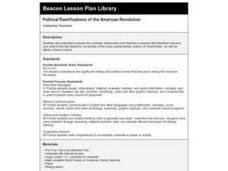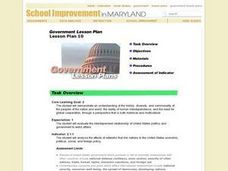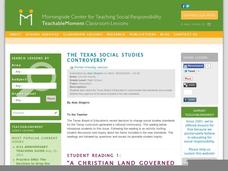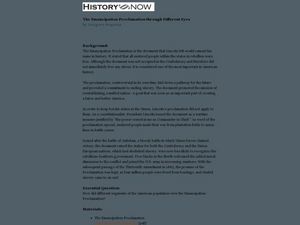Curated OER
Defining Moments From the Past: Japanese American Internment
Students conduct a mock Congressional Hearing to decide whether or not Japanese Americans who were sent to internment camps during World War II should be provided financial restitution. They research and create a time line of events...
Curated OER
Political Ramifications of the American Revolution
Pupils, in groups, research a topic from the Revolutionary War. They present their research to the class as a review and the instructor summarizes important information. They take a test on the presented topics.
Curated OER
Government Lesson Plan 18
Students identify problems with a pure market economy, and examine and explain roles of selected regulatory agencies.
Curated OER
The Institutions of Government: The Judiciary
Students explain the difference between tribal, state and federal sovereignty. Using the internet, they read Supreme Court cases that focus on Native American law. They compare and contrast the view of the case from the Native...
Curated OER
Government Lesson Plan: Lesson Plan 10
Students explore the history, diversity, and commonality of the peoples of the nation and world. They analyze how the United States' political, economic and social goals directly affect our foreign policy.
Curated OER
Local Government Internet Project
Eighth graders use given websites to gather information needed to complete a worksheet regarding county, city, and school governmental districts. They write and create presentation on their county to share with class.
Museum of Tolerance
The Role of Citizens in a Participatory Democracy
Groups research participatory democracies and compare the role and rights of citizens in ancient history with those in recent U.S. history. Guided by a series of questions, individuals compose a persuasive essay in which they discuss the...
Alabama Department of Archives and History
Alabama's 1901 Constitution
"We, the People of the State of Alabama. . ." Did you know that the Alabama State Constitution has 357,157 words while the US Constitution has only 4,400? And that it has 798 amendments while the US Constitution has...
Curated OER
The Happy Progress of Our Affairs: George Washington and the U.S. Constitution
High schoolers engage in a instructional activity which uses Washington's own words to illustrate the events leading to the establishment of our national government, and the crucial roles he played throughout that process.
Curated OER
"In God We Trust": The Camden Man Who Put the Missing Motto on the Dollar Bill
Here is a fascintating lesson which relates how the motto "In God We Trust" came to appear on all US currency. It turns out that a man from Arkansas came up with the idea and petioned his congressman and President Eisenhower himself to...
Curated OER
The Federalist Defense of Diversity: Extending the Sphere
How did early Americans ensure expansion while also securing the rights of citizens? Alexander Hamilton and James Madison, two of our early leaders, considered the problem of faction to be the "mortal disease" that created unstable...
James Madison Memorial Fellowship Foundation
A Picture is Worth a Thousand Words
This exercise on the Constitution requires small groups to design a visual metaphor that expresses the concept behind one of seven principles: popular sovereignty, federalism, republicanism, separation of powers, checks and balances,...
Curated OER
Integrity and Firmness is All I Can Promise: The Washington Presidency
High schoolers engage in a activity which addresses George Washington's leadership as President of the United States. They review a variety of letters written by Washington online, and prepare reports for the class.
PBS
What Are the Primaries and Caucuses?
What are the essential differences between primaries and caucuses? As part of a study of the process by which Americans select their candidates for US president, class members examine the nominating process, the changes that have...
National Endowment for the Humanities
Soviet Espionage in America
The war against Communism and Joseph McCarthy’s place in it are the focus of a series of three lessons examining postwar America from 1945-1950. This first lesson asks groups to read an introduction that describes the Verona Project and...
Curated OER
The Texas Social Studies Controversy
Examine the Texas social studies curriculum controversy with your class. Using a current events lesson, learners read the article "A Christian Land Governed by Christian Principles," respond to the discussion questions, and participate...
Curated OER
The Emancipation Proclamation Through Different Eyes
Students examine how various segments of the American population viewed the Emancipation Proclamation. They read the Emancipation Proclamation, analyze key terms and statements in the document, and participate in a debate.
Curated OER
What Are the Social Studies?
Identify core social studies subjects with adult learners. They will discuss key issues from twentieth century American history and identify key social studies concepts taught at elementary grade levels. They then modify this activity to...
Pulitzer Center
China's Rising Labor Movement
Young historians will explore the complex causes and effects of industrialization in China by perusing the numerous articles included in this webpage. Throughout the resource, there are many writing and discussion prompts to help direct...
Pulitzer Center
Extractive Industries
Here is a chance for environmental studies classes to take a critical look at crises occurring around the globe by reading articles and viewing video clips. The human activities under scrutiny are the extraction of oil, logging, and...
Frontline
Obama's Deal
Government classes benefit from examining how a bill passes through Congress, while they focus on the compromises made by Obama's administration regarding health care reform. This includes an online video and a couple of handouts. The...
City University of New York
The Split Over Suffrage
Compare and contrast Frederick Douglass's and the National Women's Suffrage Association's stances on equal rights and suffrage with a series of documents and worksheets. Learners work together or independently to complete the packet, and...
John F. Kennedy Presidential Library & Museum
Ask Not What Your Country Can Do for You
Ask not what the lesson here can do for you, but what you can do with the lesson. The answer is quite a lot! Young scholars revisit JFK's famous inaugural address with a focus on his plea for civic engagement. There's a...
City University of New York
Urban Politics: Machines and Reformers
What were political machines and whom did they serve? As part of a study of US immigration patterns and how these patterns influenced politics, groups investigate how Tammany Hall and other political machines gained support from voters.

























